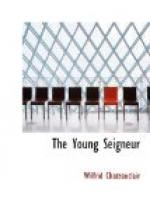“GRAND MASTER.—O, if you knew what our astrologers say of the coming age and of our age, that has in it more history within a hundred years than all the world had in four thousand years before.” —CAMPANELLA—The City of the Sun.
When they arrived before the Manor House front, Mr. Chrysler could almost believe himself in some ancestral place in Europe, the pinnacles clustered with such a tranquil grace and the walk of pines surrounding the place seemed to frown with such cool, dark shades.
Within, he found it a comfortable mingling of ancient family portraits and hanging swords strung around the walls, elaborate, ornate old mantel ornaments, an immense carved fireplace, and such modern conveniences as Eastlake Cabinets, student’s lamps and electric bell. In a distant corner of the large united dining and drawing-room, the evidently favorite object was a full-size cast of the Apollo Belvedere.
Chamilly introduced him respectfully to his grandmother, Madame Bois-Hebert, an aged, quiet lady, with dark eyes.
In the expressive face of the young man could be traced a resemblance to hers, and the grace of form and movement which his firmer limbs and greater activity gave him, were evidently something like what the dignity of mien and carriage that were still left her by age had once been.
He was tall and had a handsome make, and kindly, generous face. The features of his countenance were marked ones, denoting clear intelligent opinions; and his hair, moustache and young beard, of jet black, contrasted well with the color which enriched his brunet cheek. Whether it was due to a happy chance or to the surroundings of his life, or whether descent from superior races has something in it, existence had been generous to him in attractions.
When Madame withdrew, after the tea, he gave Mr. Chrysler a chair by the fireplace in the drawing-room end of the apartment, for it was a cool evening, and saying:—“Do you mind this? It is a liking of mine,” stepped over to the lamps and turned them down, throwing the light of the burning wood upon the pictures and objets d’art which adorned the apartment.
The great cast of Apollo, though in shadow, stood out against a background of deep red hangings in its corner and attracted the older gentleman’s remarks.
“I have arranged the surroundings to recall my first impression of him in the Vatican Galleries,” said the other. “I was wandering among that riches of fine statues and had begun to feel it an embarras, as our own phrase goes, when I came into a chamber and saw in the midst of it this most beautiful of the deities rising lightly before me, looking ahead after the arrow he has shot.”
“You have been in Italy, then?”
“I have, Sir,” he answered, “I have had my Italian days like Longfellow;” and, looking into the fire, he continued low, almost to himself:—




